
Welcome from the Chair


Welcome from the Chair
It is with great pleasure that I welcome you to the Ramsay Hospital Research Foundation Annual Impact Report. I am honoured to have been appointed Chair in the second half of 2024, following my 4 and a half year tenure on the Board.
RHRF remains steady in our mission to provide better outcomes for our patients, to investigate the diseases and illnesses which affect them, and to progress the learning and development of those who care for them. We are committed to identifying and supporting groundbreaking research that not only advances medical knowledge but addresses the broader social determinants of health.
This year has been particularly exciting, receiving 65 grant applications across the three grant schemes. The research we support is a testament to the dedication and ingenuity of our applicants and researchers, each showcasing innovative and impactful research. I’d like to thank all our researchers who took the time to prepare and submit applications, and congratulations to those who were selected for funding. From pioneering new treatments, to exploring the underlying causes of health disparities, the projects we fund are at the forefront of medical science and public health.
The impact of RHRF extends beyond just the research we fund. We strive to translate and embed this research into practice, transforming healthcare and improving patient outcomes now and into the future. By supporting research that addresses the root causes of health issues, we can contribute to a more equitable and healthier world.
As we move forward, the RHRF board will be reviewing the strategic direction of the foundation and assessing how we continue to build our capacity to enable high quality research and remain committed to our core values.
Lastly, I would like to thank the Paul Ramsay Foundation for it’s continued support and generosity towards the Ramsay Hospital Research Foundation. Our commitment to breaking the cycle of disadvantage through our research aligns closely with the vision of the Paul Ramsay Foundation, and we are proud to continue this legacy of fostering healthier communities.
Warm regards,
Professor Cheryl Jones Chair, Ramsay Hospital Research Foundation

Welcome message
“Research and clinical trials are essential to the future of healthcare, driving advancements that lead to better patient outcomes. In addition, by ensuring research includes critical social determinants of health, we ensure that these benefits reach a range of diverse communities.”
I’m delighted to share our annual Impact Report. As we reflect on the past year, it is wonderful to witness the continued growth of Ramsay Hospital Research Foundation, and the ongoing development of research activities within Ramsay Health Care. This growth is only made possible by the funding from the Paul Ramsay Foundation, and the incredible dedication of our team, our researchers, and our hospitals.
RHRF is committed to improving health outcomes for all, and this year we have made considerable progress towards this goal through funding high quality research that tackles some of the most pressing issues in healthcare.

This, in conjunction with our Translational Challenge Grant stream and our Collaborative Research Request stream, allows us to form partnerships across the healthcare sector to ensure we support research from conception to implementation. We have a strong focus on addressing health inequities and improving patient outcomes by supporting research that targets critical social determinants of health.
I’d like to thank the ever-growing team within RHRF who continue to drive the foundation towards its mission, the incredibly dedicated and passionate researchers who we work with, and the Ramsay Clinical Trials Network that continues to develop and facilitate high quality research around Australia. Further, I’d like to acknowledge the support of the RHRF Board of Directors and their invaluable contributions to our broader strategy.
As we begin to plan for the next 5 years, I look forward to the development of meaningful partnerships and expansion of RHRF capabilities to support our research mission. Ultimately, through our focus on improving patient outcomes I look forward to changing the health trajectory for patients and their families and ultimately shaping our furture healthcare ecosystems.
Warm regards,
Nicola Ware CEO, Ramsay Hospital Research Foundation Head of Research, Innovation & Integrated Care
Mission
To provide better outcomes for our patients, to investigate the diseases and illnesses which affect them and to progress the learning and development of those who care for them.
FUND & SUPPORT
high quality research
ENHANCE research enablers to facilitate high quality research
Our research success is driven by the passion and expertise of the researchers, academics, clinicians, and staff who share a commitment to improving patient outcomes. This dedication is strengthened by Ramsay’s diverse ecosystem of clinical care across therapeutic areas, particularly in Cancer, Cardiovascular, Orthopaedics, and Mental Health. We seek to fund research in these areas to leverage the breadth and depth of clinical experience, supported by cutting-edge infrastructure and robust ethics and governance frameworks.

DEVELOP patient & key stakeholder relationships
CULTIVATE a high quality national Clinical Trials & Research Network
ADDRESS systems change that aim to improve social determinants of health
OPTIMISE governance and funding processes
Our work benefits the broader community by tackling pressing health issues across diverse communities. We partner with universities, public healthcare entities, and medical research organisations to drive research that benefits all Australians. By fostering these partnerships and committing to addressing the social determinants of health, our research aims to improve patient outcomes and facilitate the translation of research into health services, ultimately driving advancements in the broader healthcare landscape.
RHRF Impact
Total funding awarded by RHRF
Completed RHRF funded projects
RHRF Funded Projects by Therapeutic Area
Projects funded by RHRF
Publications from funded projects
Projects have been awarded funding in partnership with successful NHMRC or MRFF grants
Biostatistical consultations conducted in the services pilot phase
Consumers input into the development of RHRF’s Research Consumer Engagement Framework
Strategic collaborations with core industry partners days average approval time for new applications by the Ramsay Research Ethics & Governance
Clinical Trial Sites
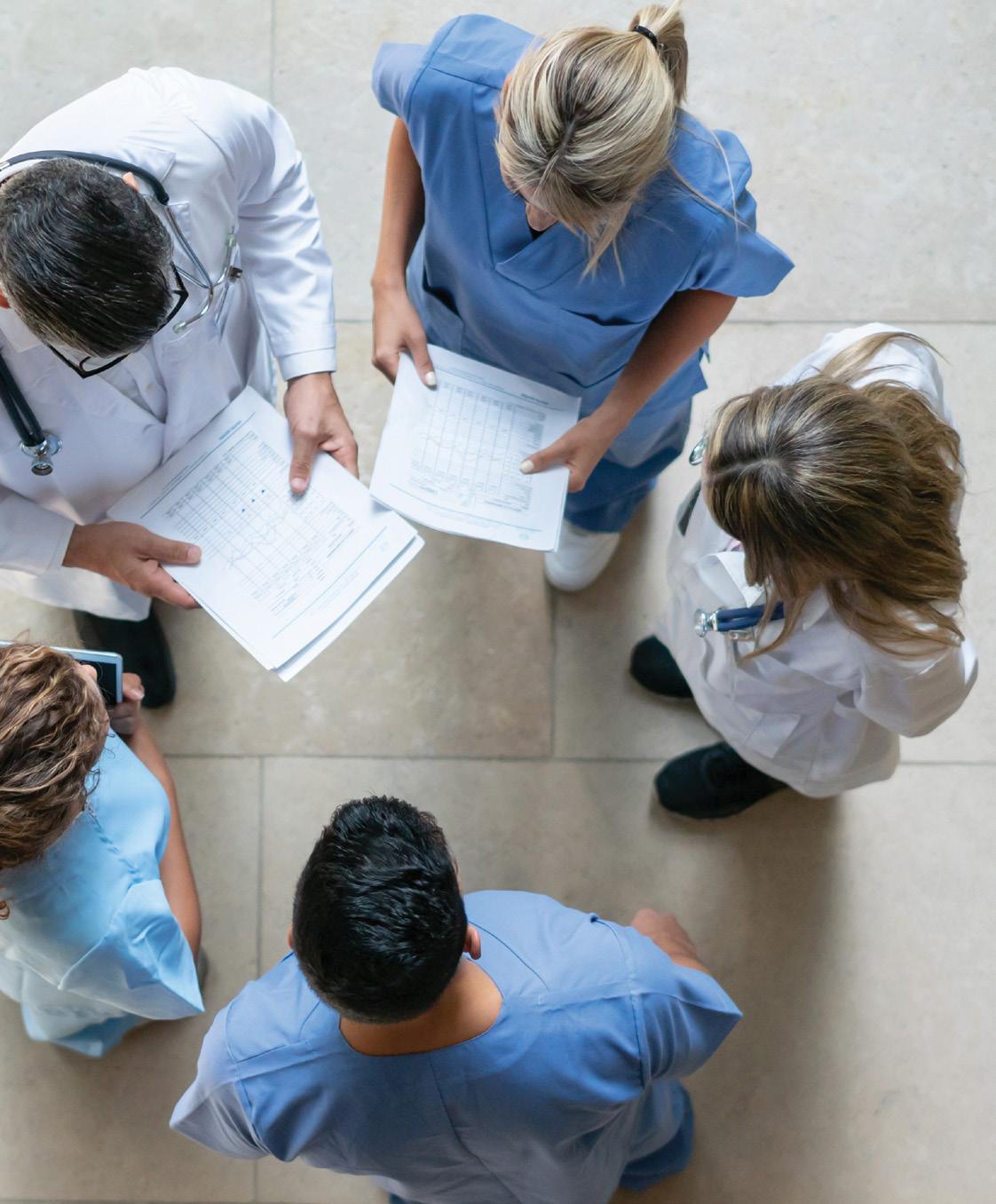
Principal Investigator: Professor Jane Fisher
Funding Awarded: $400,000
“In every other workplace you have onboarding, training, supervision ecetera, but the work of motherhood you don’t have that... I would like there to be more valuing of motherhood and a broader realisation that we might avert mental health problems if we provide some supportive education for parents.”
Project Overview
An electronic patient-reported outcome system was implemented and evaluated at Ramsay Health Care’s Masada Private Hospital Early Parenting Centre (MPHEPC) and was shown to improve maternal and infant health. The current project aims to extend this system to Tresillian Family Centre’s Nepean Residential Service, forming a research collaboration to adapt and implement the system, ultimately enhancing care for families with considerable psychosocial and economic vulnerabilities.
Healthcare Impact
A consistent evidence-informed set of patient reported outcome measures can be used to harmonise approaches to clinical care, program content, and service enhancements as well as benchmark programs in public and private sectors. In the long term these data will inform a registry of joint mother baby admissions for sustained monitoring of quality of patient care in early parenting centres.
Conferences
Study PI, Professor Jane Fisher has presented her work in this area at the ‘International Marcé Society for Perinatal Mental Health’ Conference 4-7 September 2024 in Barcelona, Spain. The presentation attracted international interest and shows promise for initiating discussions around global implementation.
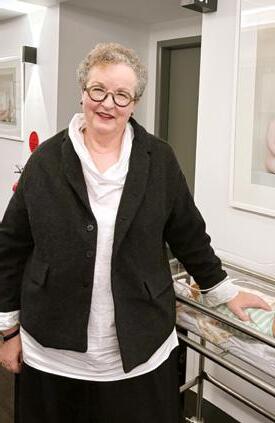
Social Impact
It is not yet known whether there are differences in needs and social circumstances between people seeking care at public and private Early Parenting Centres.
This study will be able to document these differences and establish in what ways they are or are not linked to outcomes. The data will provide the foundation for program enhancements to address socioeconomic disadvantage experienced by parents and infants.
Publications
Fisher J, Stanzel K, Nguyen H, Thean P, French D, Popplestone S, Tran T. Impact of a private sector residential early parenting program on clinically significant postnatal depressive symptoms experienced by women: Audit of routinely collected data. Acta Psychiatr Scand. 2024 Nov;150(5):458-473. doi: 10.1111/ acps.13668.
Tran T, Stanzel K, Nguyen H, Thean P, French D, Popplestone S, Fisher J. Effects of a residential psychoeducational parenting program on maternal anxiety and fatigue symptoms. J Reprod Infant Psychol. 2024 Jan 10:1-17. doi: 10.1080/02646838.2024.2303468
Principal Investigator: Associate Professor Narinder Singh
Funding Awarded: $400,000
Aboriginal and Torres Strait Islander children living in rural and remote areas have the highest rates of ear disease in the world. The World Health Organization has declared this an Australian “Public Health Crisis” requiring urgent and innovative solutions.
Project Overview
DrumBeat.ai is an innovative, translational and collaborative partnership between universities, tech companies, government and Aboriginal and Torres Strait Islander people to accurately diagnose severe ear disease in rural and remote children.
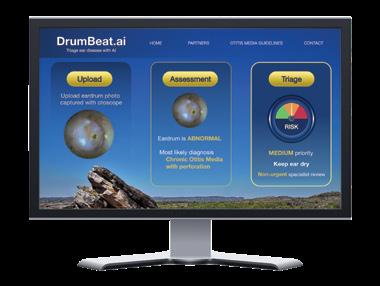
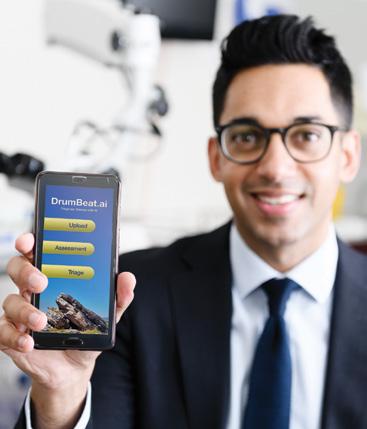
The research team have spent five years developing an Artificial Intelligence (AI) tool for Indigenous children, supported by Microsoft’s AI for Good Lab. Using deep learning methods, they have created a highly accurate AI-based tool to identify ear disease from over 10,000 otoscopic images of 4,000 children across 100 rural and remote communities. This will enable an untrained health worker in the community to use an otoscope for instant and accurate diagnosis, facilitating immediate and appropriate medical treatment.
Patient and Healthcare Impact
Early detection and treatment of ear disease may
• Prevent long-term hearing loss
• Enable children to continue developing their speech, language, and cognitive skills
• Reduce social isolation for children
• Help children fully engage with their communities
• Allow children to reach their academic potential
• Improve employment prospects compared to if they were hearing impaired.
Project Update
The team are now pursuing in-field trials at four research sites comprised of urban, regional, rural, and remote settings, to evaluate the algorithm’s performance in the real-world.
Principal Investigator: Professor Jeanne Tie
Funding Awarded: $399,627
“My motivation behind this project is that despite the curative intent of surgery and chemotherapy, about 15% of patients develop peritoneal relapse... and current imaging methods have limited sensitivity for early diagnosis.”
Patients with peritoneal metastases have an extremely poor survival (average survival < 12 months) because they are often underdiagnosed by standard imaging methods and have a poor response to systemic treatment. This project aims to use state-of-the-art technology to analyse cancer DNA in abdominal fluid in bowel cancer patients to accurately identify peritoneal disease at the micro-metastatic stage and predict future relapse.
Early detection of microscopic peritoneal spread will provide an opportunity for earlier intervention (e.g., intra-peritoneal chemotherapy) to prevent peritoneal relapse and improve survival. Earlier diagnosis of peritoneal disease will increase the chance of treatment success in eradicating micrometastatic disease when the cancer burden/ volume is still low, improving patient’s chance of cure. ptDNA analysis can be used as a biomarker to enrich patients at high risk of peritoneal recurrence for future intervention trials exploring novel peritoneal directed therapy.

This project will target a diverse patient population, including disadvantaged regional/rural patients, with participation from a regional Ramsay site and will measure participants socioeconomic disadvantage using the index of relative socioeconomic advantage and disadvantage (IRSAD). Testing the feasibility of centralised molecular testing for samples collected from a diverse hospital setting, will enable equitable access to expert diagnostics.
The ability of ptDNA testing is also being tested in other solid cancers such as gastroesophageal and gastric cancer. Once the prognostic impact of ptDNA analysis is confirmed in these observational proof of concept studies, the project team envisions starting treatment interventional trials that incorporate ptDNA and ctDNA analysis.
This project has successfully attracted additional funding through the ‘Tour de Cure’ grant to fund study follow-up in year 4 and 5 of the project.
Principal Investigator: Dr Sarah Price
Funding Awarded: $337,000
“I want to make sure an increasingly diverse population of women are able to pursue pregnancy if they want to and to pursue it safely.”
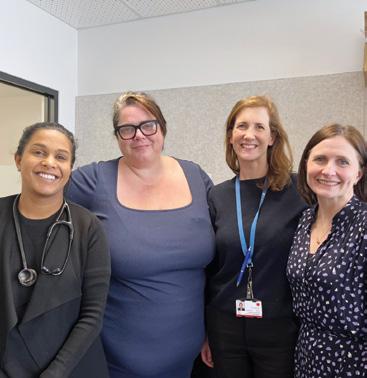
Project Overview
Young women with metabolic diseases such as obesity, diabetes, and hypertension face significant risks of having offspring with serious health issues. This project aims to provide all Australian women with adequate access to preconception care, by developing an app-based risk calculator and integrating high-risk women into existing maternity services.
Patient Impact
This project will allow for the prediction of women with metabolic diseases who are at the highest risk of poor pregnancy outcomes, allowing for earlier intervention and a better identification of individuals who should receive the hospitals pre-conception and early pregnancy healthcare programs.
Social Impact
The women at the highest risk of poor pregnancy outcomes are those of low SES, non-English speaking background and those from culturally diverse groups. These women also have the poorest access to healthcare before and during pregnancy. This project will allow for better targeting of resources based on risk.
Improved outcomes for Offspring
Reduced rate of congenital abnormalities, reduced rate of pregnancy complication resulting in premature delivery, reduced rate of early metabolic diseases in childhood.
Mothers
Reduced rate of pregnancy complications, reduced progression of metabolic disease, reduced rate of early cardiovascular disease.
Families
Use of a risk calculator in young women of reproductive age by any healthcare provider will prompt discussion about metabolic health. These provide a forum for education and de-stigmatisation of metabolic disease.
Recruited 340+ patients so far, with recruitment ongoing
Future Plans
This project has successfully secured additional partial funding through an NHMRC Investigator grant, and once completed, anticipates trialling the developed risk calculator app to determine its impact before wider dissemination.
Principal Investigator: Associate Professor Sam Adie
Funding Awarded: $399,052
“It
will be the first time a comprehensive, multidisciplinary model of care will be used and tested by surgeons and other clinicians to manage these patients.”
Project Overview
This project will investigate the effectiveness, costeffectiveness, and safety of a model of care to manage patients with persistent pain after Total Knee Replacement (TKR).
About 1 in 4 Australians develop persistent pain after TKR and currently, there is no established model of care to effectively manage these patients.
The EPIK Trial, which is based on an overseas model of care, will address how a coordinated, multidisciplinary model-of care can improve outcomes and reduce costs for people with persistent pain post TKR ensuring they get the right care at the right time.
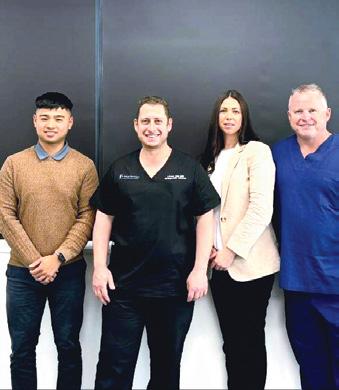
Healthcare Impact
The trial will be nested in the Australian Orthopaedic Association National Joint Replacement Registry (AOANJRR) and use telehealth to provide some elements of care. EPIK will address key problems with clinical practice and health systems effectiveness after TKR, namely a lack of coordinated and accessible clinical care. This new approach will improve outcomes for people with persistent pain post-TKR and change management nationally, by embedding pain screening and care coordination into routine post-operative data collection.
Social Impact
Successful scale-up and implementation will improve the lives of thousands of people with persistent pain after TKR and enable more equitable access to effective care for people living in regional, rural or remote areas and those of lower socioeconomic status, who would otherwise have limited access to effective treatments. More broadly, EPIK has the potential to transform care for Australians who need it the most.
This project has attracted additional funding from NHMRC to allow for its continued development and expansion. EPIK will be embedded within the AOANJRR, which records data from all TKR procedures in Australia. If the model-of-care is effective, cost-effective and acceptable, national roll-out will be pursued.
Orthopaedic Surgery & Musculoskeletal Injury
Principal Investigator: Dr Deanne Jenkin
Funding Awarded: $366, 852
“Our previous trial found that a strong opioid was not superior to a mild opioid after hospital discharge from bone fracture surgery. However, there remains a knowledge gap on whether opioids are effective at all after discharge. The ROAD trial will address this important knowledge gap.”
Project Overview
Up to 70% of Australian hospitals send patients home with opioids ‘just-in-case’. This overprescription is associated with avoidable chronic opioid use, addiction, overdose and death. This trial will identify which patients can be managed without opioids at discharge and demonstrate the real-world effectiveness, safety and acceptability of opioid-free prescribing in these patients.
Social Impact
Data on the long-term socioeconomic impact of orthopaedic trauma is limited but suggests that 13% of fracture patients may lose employment due to injury. Similarly, low socioeconomic status is associated with persistent opioid use both among people in working age and older people. Reducing unnecessary and harmful opioid use, in this at-risk patient population, means that there are significant opportunities for health gain by better management of in-hospital and postdischarge analgesia.
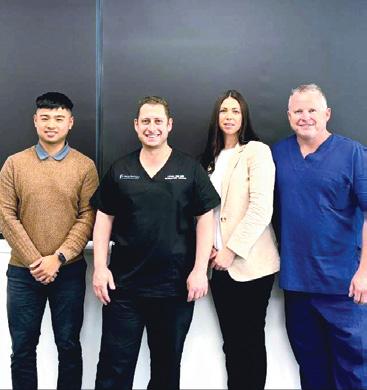
Patient and Healthcare Outcomes
1.
2.
Improve outcomes for people with bone fractures and change the way orthopaedic surgeons and other health professionals manage these patients nationally and internationally.
Fundamentally lead to reduced harm, reduced costs, greater satisfaction, and fewer complications for patients with fractures post-surgery.
3.
Likely be suitable and scalable to other post-surgery patients by embedding opioid-free prescribing into routine post-operative care at major hospitals, thus adding to the national priority of reducing inappropriate opioid use in Australia.
Each additional week of opioid use post-discharge is associated with an average increase rate of opioid misuse of 34.2%, thus minimising opioid prescription at discharge may prevent persistent opioid use in thousands of Australians who sustain bone fractures each year.
Orthopaedic Surgery & Musculoskeletal Injury
Principal Investigator: Professor Peter Youssef
Funding Awarded: $399,999
“It’s very exciting to be doing an implementation study across private and public hospital sites that will significantly impact the quality of life of our elderly patients and which I am hopeful will lead to strong long -term collaboration in other areas of need.”
Project Overview
This project aims to improve mobility and reduce falls in hospitals by implementing an adapted mobility and falls prevention program in two Sydney hospitals
Patient Impact
The anticipated outcomes include improved balance and mobility in patients, leading to fewer falls during and after hospital stays, reduced re-admissions, and improved quality of life and patients’ satisfaction.
Healthcare Impact
The project is expected to transform healthcare delivery by integrating a targeted, evidence-based mobility and falls prevention program into routine hospital care. The team will work together with clinicians and patients to ensure the program is acceptable, feasible and can be sustained beyond the project duration.
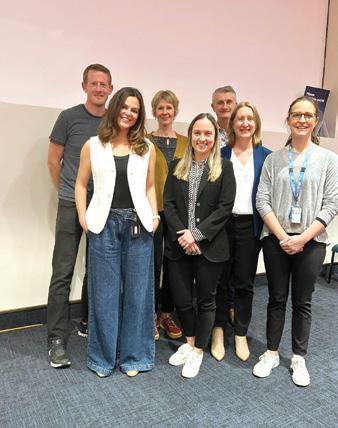
Social Impact
Lifestyle risk factors are the primary social determinant of health addressed in the project. The project aims to improve balance, mobility, and health outcomes by embedding a circuit exercise class into routine hospital care, particularly benefiting patients with lower socioeconomic status who lack access to post discharge physiotherapy.
Future Plans
The team have applied for additional funding through an NHMRC Investigator Grant and an internal scheme from South Eastern Sydney Local Health District (SESLHD) to expand the project and are awaiting outcomes.
Implementation
This project seeks to inform practice directly and facilitate rapid translation. The design of this intervention is responsive to local needs and conditions which enhances its ability to be translated into practice across wards and health services, as opposed to highly prescriptive interventions which can be a challenge to implement broadly. The Intervention Scalability Assessment Tool (ISAT) will be used to guide the implementation process.
InterMittent Pneumatic cOmpression devices be Standard therapy for the prevention of venous Thrombo-Embolic events in major surgery? Protocol for a RandomiSed clinical trial (IMPOSTERS).
Principal Investigator: Professor Stephen Smith
Funding Awarded: $350,174.50
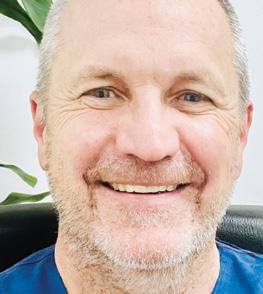
“The motivation for my research is to provide my current patients with the best possible surgical care available, while ensuring the next ones get better care.”
Project Overview
Venous thromboembolism (VTE) is a significant risk following major surgery, with current prevention strategies including low molecular weight heparin (LMWH) and mechanical methods like graduated compression stockings (GCS) and intermittent pneumatic compression devices (IPCDs). This study aims to determine if using only LMWH and GCS is as effective as including IPCDs, potentially improving patient comfort, reducing costs and contributing to more sustainable and efficient healthcare practices
Patient and Healthcare Impacts
Reduce patient pain and discomfort, enhancing inpatient sleep quality following surgery and promoting unhindered mobility, fostering independence in rehabilitation.
Reduce nursing burden and cost by eliminating the repetitive fitting and removal of compression devices, streamlining healthcare practices.
Social Impact
Assuming a non-inferior outcome, a cost minimisation analysis will compare the costs of each study arm by examining healthcare resource use and patient incurred expenses, with data collected from hospital databases, patient surveys, and national Medicare records. Sensitivity and budget impact assessments will explore cost variations and the potential for applying the findings to other surgical settings, addressing social determinants by considering both healthcare accessibility and financial burden on patients.
Result in economic advantages in the form of savings for IPCDs, reduction in nursing hours and potential for shorter length of stay from more rapid mobilisation.
Result in environmental advantages with less plastic waste and need for disposal.
Future Plans
The trial is currently underway at John Hunter Hospital and Calvary Mater, with setup progressing at other hospitals. The team is currently applying for additional funding to subsidise the in-kind trial coordinator positions at John Hunter Hospital to support the ongoing trial.
Principal Investigator: Professor Geoffrey Tofler
Funding Awarded: $400,000
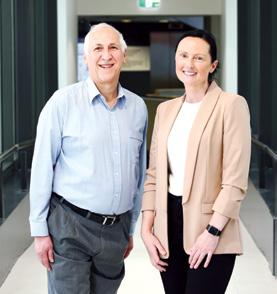
“The ongoing high mortality and morbidity due to cardiovascular disease together with the under recognised importance of triggers such as acute emotional stress, motivates us to investigate a novel Triggered Acute Risk Prevention approach to reduce cardiovascular risk due to emotional stress and other triggers.”
Project Overview
Triggers such as acute emotional stress have been identified in up to half of heart attacks and stroke, yet until now, have not been used for preventive strategies. This project aims to evaluate a novel care model, Triggered Acute Risk Prevention (TARP), which helps individuals with cardiovascular disease (CVD) identify acute emotional stress through educational resources and respond appropriately with medication (propranolol and aspirin).
Patient and Healthcare Impacts
This transformative project provides tools to individuals and healthcare professionals that go beyond conventional healthcare delivery based on daily medication directed by clinicians.
Patients will be empowered to recognise and manage acute emotional stress and become aware of how emotional stress and other triggers transiently increase cardiovascular risk, and the value of addressing them.
The TARP model is more than an intervention; it’s a guide to a future where improved cardiovascular health and mental well-being seamlessly come together, ushering in an era of resilience, proactivity, and improved quality of life, and with even broader potential applications to healthcare delivery.
This project enables people with lower education levels and restricted access to healthcare to reduce their cardiovascular risk during emotional and other triggers by providing immediate preventive therapy and educational advice, thereby improving their ability to access and utilise health information for their benefit. It builds on evidence that education and improved understanding help equip people to make informed health care choices to cope with and prevent ill health.
The team is aiming to integrate the study concepts into a novel model of care that includes providing low dose medication (propranolol and aspirin) and an educational package to reduce the stress level and cardiovascular risk due to acute emotional stress. The provision of the educational package for triggers accessible through an app and a dedicated website, will promote widespread dissemination and utilisation, while future development and expansion will build on the project to initiate a large, randomised trial powered for hard cardiovascular endpoints.

study: Testing risk genes in conjunction with clinical characteristics to develop a clinically applicable algorithm for predicting outcomes in patients with depression
Principal Investigator: Professor Philip Mitchell
Funding Awarded: $678,994
Project Overview
Triggers such as acute emotional stress have been identified in up to half of heart attacks and stroke, yet until now, have not been used for preventive strategies. This project aims to evaluate a novel care model, Triggered Acute Risk Prevention (TARP), which helps individuals with cardiovascular disease (CVD) identify acute emotional stress through educational resources and respond appropriately with medication (propranolol and aspirin).
“The aim of the study is to use modern genetic techniques - polygenic risk scores - to improve our capacity to predict outcomes for patients with depression.”

Patient and Healthcare Impacts
If the genetic risk profile of a patient can be linked to an outcome, it will result in a quicker and easier diagnosis for patients and an improved capacity for more accurate treatment, resulting in betteroutcomes for patients.
Project Update
Inpatients with depression have been successfully recruited and assessed via structured interviews and genotyped through the Australian Genome Research Facility (AGRF).
The project has been presented at the International Society for Bipolar Disorders conferences in 2019 and 2024.
Detailed analyses are about to commence.
Principal Investigator: Professor Malcolm Hopwood
Funding Awarded: $762,216
“Our aim is better targeted treatment in mental health.”
Medication selection for Major Depression and Bipolar Disorder is often a trial-anderror process. Only 35% – 45% of individuals achieve symptom remission following their first trial of antidepressants (selective serotonin reuptake inhibitor (SSRI) or selective serotonin/ norepinephrine reuptake inhibitor (SNRI)). One reason for this is common variations in specific genes can influence the bioavailability of the drugs.
Project Overview
This study is investigating a genetic test that could identify genetic markers and subsequently assist with determining who will or will not respond to psychotropic treatment, assisting doctors in choosing the best medication for each patient.
Project Update
1. Recruited over 300 participants
2. Largest non-industry sponsored study in this therapeutic area
3. Methods paper is in preparation for publication
4. The study has been presented at multiple conferences

Patient and Healthcare Impacts
Reduced illness duration
Fewer side effects for patients
Reduced personal suffering and suicide
Reduction in cost burden of severe mood disorders
Personalised pharmacotherapy for mood disorders would revolutionise patient care and healthcare practice. The study could assist in reducing the cost burden of Major Depression and Bipolar Disorder and provide decision makers with information for informed policy changes associated with treatment of severe mood disorders
Future Plans
Dependent on results, the next steps include engagement in the development of new guidelines for this area and broadening the utilisation of the genetic test to all mental health disorders.
Principal Investigator: A/Prof Samuel MacDessi
Funding Awarded: $437,770
“This project addresses the critical issue of the effectiveness of robotic-assisted surgery, particularly in the context of kinematic alignment (KA), which is an innovative approach to knee replacement. Currently, there’s a lack of robust evidence supporting the claims of improved outcomes in robotic-assisted surgeries. Additionally, it’s unclear whether the benefits of robotic knee replacement stem from surgical precision, KA techniques, or a combination of factors.”
Total Knee Arthroplasty (TKA) is a successful procedure however up to 18% of patients are dissatisfied with their surgery
This may result in
• Functional impairment
• Reliance on opioid analgesia
• Revision knee surgery.
While causes for dissatisfaction are multifactorial, a common generator is inappropriate soft tissue tension.
Project Update
This project has successfully reached its target of 300 recruited participants.
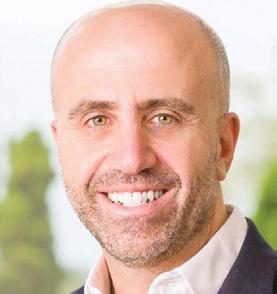
Prohect Overview
The RASKAL study is a registry-nested, multi-centre, 2 x 2 factorial randomised trial of clinical, functional, radiographic and survivorship outcomes. This study assesses two relatively new developments that are thought to more precisely align and balance a knee prosthesis: Robotic-Assisted Surgery (RAS) and Kinematic Alignment (KA).
Healthcare Impact
The outcomes of this research will inform decision making processes to provide the best, most cost effective care for patients undergoing Total Knee Arthroplasty (TKA).
By comparing different surgical approaches, the study will contribute to improving patient outcomes and optimising resource allocation in healthcare delivery.
All Patient Reported Outcome Measures (PROMs) data collection is complete up to 6-months postoperatively with a greater than 90% capture rate.
This research outcomes will be submitted to a high-impact journal for publication, and it is anticipated that the results of this research will inform future clinical research, practice and surgical guidelines.
Principal Investigator: Professor Joanne Shaw
Funding Awarded: $260,070
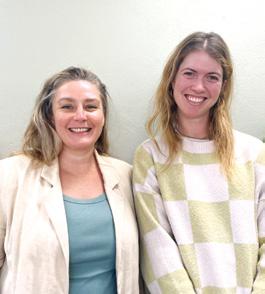
“One in three people with cancer experience clinical levels of anxiety and depression. It is therefore important to ensure that these people are identified in routine cancer care and referred to the appropriate level of psychological support, tailored to their symptom severity.”
Project Overview
Anxiety and depression in cancer patients is not routinely identified, and access to treatment is limited due to insufficient hospital-based psycho-oncology services and lack of clear evidence-based care pathways. This research will provide a model of shared care to integrate sustainable and effective screening, detection, and management of anxiety and depression into private cancer services and community-based psychology, and how best to implement this model across Australia.
Project Update
The ADAPT Clinical Pathway and portal went live in July 2023 and the project is now in its final stages.
Healthcare Impact
Identifying cancer patients experiencing psychological distress and directing them to appropriate support can significantly improve patient outcomes. By integrating this screening process into routine cancer care ensures that no one is overlooked and helps normalise the experience, thereby increasing patients’ willingness to accept referrals for psychological support. Additionally, this will significantly reduce morbidity, the burden of disability, and costs for the health system.
A study poster was presented at the 25th International PsychoOncology Society (IPOS) World Congress in Maastricht, the Netherlands from 24-26th September 2024.
Discussions around ongoing implementation of the ADAPT Clinical Pathway are underway with the intention to disseminate the model nationwide.
Principal Investigator: Dr Donel Martin
Funding Awarded: $1,147,926
“My hope is that our trial will facilitate the potential for better outcomes for people living with anorexia.”
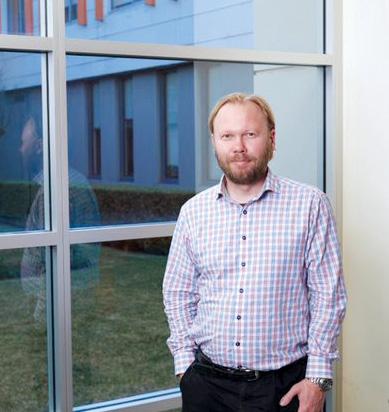
Project Overview
The TRENA trial is a Randomised Control Trial comparing the effectiveness of two brain stimulation treatments, transcranial direct current stimulation (tDCS) and repetitive transcranial magnetic stimulation (rTMS) in the treatment of anorexia nervosa.
It is one of the largest studies of its kind showing the feasibility and acceptability of administering brain stimulation for anorexia in both inpatient and outpatient settings.
Patient and Healthcare Impacts
The project aims to provide the first comparative evidence of the therapeutic effects of two different forms of non-invasive brain stimulation for people with anorexia. It is anticipated that adding brain stimulation to patients’ current treatment will assist with further improving their everyday functioning and quality of life.
Future Plans
Having the findings of this research progressing to a translational pathway is an important aim of the TRENA Trial. The next steps involve developing a protocol for a definitive multicenter trial of brain stimulation for anorexia.

See It Online
Watch a Ramsay Rapid Research video with Dr Donel Martin explaining the TRENA Trial. www.youtube.com/watch?v=6zfw18VsU-k&t=34s
Publication
Harvey AJ, Madden S, Rodgers A, Bull M, Chatterton ML, Hadzi-Pavlovic D, Loo CK, Martin DM. Randomised controlled trial of neurostimulation for symptoms of anorexia nervosa (TRENA study): study protocol. J Eat Disord. 2023 Dec 8;11(1):218. doi: 10.1186/ s40337-023- 00940-7. PMID: 38066658; PMCID: PMC10709845

Principal Investigator: Professor Diana Slade
Funding Awarded: $726,146
“Empowering patients with chronic heart failure to become effective self-managers of their condition is now recognised as economically, socially and politically essential and is consistent with policy directives that promote ‘patient-centered care’.”
Heart failure (HF) affects around 476,000 Australians with vulnerable groups like those facing economic disadvantage and lower health literacy experiencing higher rates of hospitalisations and less evidence-based treatment, indicating barriers to effective self-management.
This project will...
Measure patients’ health literacy, empowerment, quality of life, and HF knowledge at three time points.
Analyse clinician consultations for 30 patients over six months.
Develop an intervention to improve health literacy, empowerment, and self management.
Pilot and evaluate the intervention both qualitatively and quantitatively.
Patient and Healthcare Impacts
The project seeks to improve the ways in which clinicians communicate in supporting patients with heart failure to increase their health literacy skills, participate actively in shared decision-making and selfmanage effectively.
The project treats health literacy as an organisational value achieved through effective communication across all levels from policy to practice to individual patient level.
It advocates for health literate health care organisations that support patients to source, understand, and use information and services in order to self-manage and take care of their health.
Project Update
The study was presented at the International Conference on Communication in Healthcare 2024 in Zaragoza, Spain as well as the 22nd International and Interdisciplinary Conference on Communication, Medicine and Ethics, hosted at the University of Brescia, Italy. Data collection is complete and the study team are currently analysing the data which will inform the development of future interventions in this area.
See It Online
Watch a Rapid Research Video on the project here: Ramsay Rapid Research with Prof D Slade, Prof C Etherton Beer, Prof W Abhayaratna, Prof R Saunder (youtube.com)

light: A simple screening blood test to help in the early identification of neurological and neurodegenerative disorders in people presenting with mood and anxiety disorders
Principal Investigator: Professor Dennis Velakoulis
Funding Awarded: $749,845
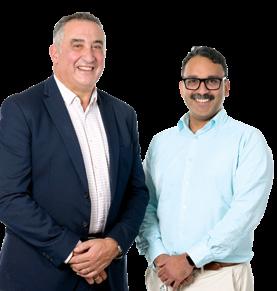
“Differentiating between mental illness and dementia can be difficult, which is why we need a simple blood test to help answer this important question to guide patients, carers and clinicians.”
Project Overview
A common clinical question faced by doctors treating people with psychiatric presentations is whether a person’s symptoms are due to their mental health disorder, medications, or the first sign of a neurodegenerative disease. Royal Melbourne Hospital Neuropsychiatry and Ramsay Health Care are collaborating to help answer this question by developing a simple screening blood test measuring neurofilament light (NfL) to screen for dementia. NfL is released into the blood stream when brain cells are dying and is therefore elevated in people with neurodegenerative disease.
Patient and Healthcare Impact
A blood test that can screen for dementia will help reduce the diagnostic odyssey that patients and carers face, allowing them to access early interventions and tailored care as well as alleviate time and costs associated with current investigative practice.
Social Impact
Lifestyle risk factors are the primary social determinant of health addressed in the project. The project aims to improve balance, mobility, and health outcomes by embedding a circuit exercise class into routine hospital care, particularly benefiting patients with lower socioeconomic status who lack access to post-discharge physiotherapy.
The ultimate aim of this study is clinical translation – to implement a routine screening blood test for neuronal injury, that is simple, cheap, and easily available across Australia, and accessible to all. With additional funding, the project also plans to explore other psychiatric disorders, as well as measure the blood-based biomarkers serially to better understand how these markers behave with time, depending on the condition that patients have.
This project has attracted additional funding (through RANZCP and The Royal Melbourne Hospital Research Foundation) for further sub studies looking into blood based biomarkers of neuronal injury and astrocyte activation in ECT, and an analysis of serial blood samples in patients with depression receiving low dose ketamine treatment.
Publications
(Preprint) . Matthew JY Kang, Jasleen Grewal, Dhamidhu Eratne, Charles Malpas, Wei-Hsuan Chiu, Kasper Katisko, Eino Solje, Alexander F Santillo, Philip B. Mitchell, Malcolm Hopwood, Dennis Velakoulis. Neurofilament light and glial fibrillary acidic protein in mood and anxiety disorders: A systematic review and metaanalysis. medRxiv 2024.03.07.24303938;
(Preprint) Matthew Kang, Dhamidhu Eratne, Olivia Dean, Michael Berk, Adam J Walker, Cassandra Wannan, Charles B Malpas, Claudia Cicognola, Shorena Janelidze, Oskar Hansson, Jasleen Grewal, Philip B Mitchell, Malcolm Hopwood, Christos Pantelis, Alexander F Santillo, Dennis Velakoulis. Plasma Glial Fibrillary Acidic Protein and Neurofilament Light are Elevated in Bipolar Disorder: Evidence for Neuroprogression and Astrocytic Activation. medRxiv 2024.07.30.24311203;
eCliPSE Project: enhancing social inclusion through the implementation of evidence-based digital health interventions for mental health and alcohol/other drug use problems in the wake of COVID-19
Principal Investigator: Professor Frances Kay Lambkin
Funding Awarded: $734,892

“Our aim is to bring high quality, evidence-based treatment for multiple health problems directly to the person – to ensure that the right person receives the right intervention at the right time.”
Project Overview
eCliPSE is an implementation trial testing a digital ecosystem designed to provide 24/7 access – at no cost – to high quality, evidence-based, clinical treatment for people experiencing depression, anxiety, alcohol/other drug use and trauma, as well as help for families and friends who are supporting loved ones experiencing these conditions.
Patient and Healthcare Impact
eCliPSE holds a lot of promise in being able to transform the way we seek and access support for our mental health and wellbeing. This research shows that the programs in eCliPSE help just as much and in a similar way to traditional therapy, and in collaborating with fantastic clinicians, it can offer more support and treatments to those who need it.
Outputs
Poster Presentation at APSAD (Australasian Professional Society on Alcohol and Other Drugs) 2023 in Adelaide, Implementing digital interventions for comorbid mental health and alcohol and other drug use problems in health and community settings: eCliPSE, a cluster randomised controlled trial.
Presentation at the 43rd Annual Society for Mental Health Research (SMHR) Conference, held at the Rendezvous Hotel Perth Scarborough from 29 November to 1 December 2023. “Electronic Clinical Pathways to Service Excellence (eCliPSE): A digital hub facilitating access to evidence-based support for cooccurring mental health and substance use problems.
It is critical that eCliPSE remains current and sustainable, the team have engaged with service providers in mental health, and alcohol and other drug use sectors, as well as other health specialists to continue to provide updated and novel clinical pathways to care to increase the reach and usability of eCliPSE. Currently, the team are working on including chronic health modules on eCliPSE next, due to the known correlation between physical and mental health.
Publications
Rich, Thornton, Sampson, Kay-lambkin (2023) Implementing digital interventions for comorbid mental health and alcohol and other drug use problems in health and community settings: eCliPSE, a cluster randomised controlled trial, Drug and Alcohol Review 2023 Vol. 42 Issue S1 Paper 178 Pages S3-S196 DOI: https://doi.org/10.1111/dar.13749 . (preprint) Kay-Lambkin, F., Rich, J. L., Sampson, D., Thornton, L., Heinsch, M., Filia, K., ... & Teeson, M. (2023). Enhancing social inclusion through the implementation of evidence-based digital health interventions for mental health and alcohol other drug use problems in the wake of COVID-19: A study protocol. medRxiv, 2023-09.
PREPARE (Peer-Reviewed Evaluation of Performance in Accordance with Registry-based Evidence) Study: knowledge transfer and improved outcomes for hip and knee arthroplasty via de-identified direct online communication
Principal Investigator: A/Prof Michael McAuliffe
Funding Awarded: $398,012

“My motivation for this study was to get surgeons to better engage with their surgical results and thus improve outcomes for patients”
Project Overview
This study aims to develop a detailed mentoring and interview program to transfer knowledge and feedback on total hip and total knee arthroplasty to junior surgeons via a novel online meeting platform.
Project Update
The project team have successfully completed the development of an innovative digital solution in the form of a first of its kind app. This app allows for deidentified discussion of surgical outcomes and has already been utilised in initial surgeon interviews. This project is still in its early stages and the next steps are to continue to log surgeon interviews and build the database.
Plans
The study team will continue to log surgeon interviews, and as the data accrues may consider seeking additional funding to continue its development.
Patient Impact
By short circuiting the learning cycles the study allows for accelerated benefits for patients, like improved patient satisfaction and decreased rates of revision join replacement.
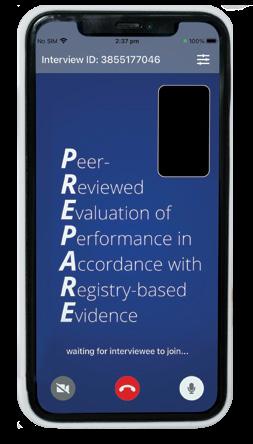

“Research and clinical trials are essential to the future of healthcare, driving advancements that lead to better patient outcomes. In addition, by ensuring research includes critical social determinants of health, we ensure that these benefits reach a range of diverse communities.”

Development and implementation of an advanced clinical decision-making support tool for the delivery of efficient, personalised rehabilitation for patients undergoing total knee arthroplasty (TKA).
Principal Investigator: Professor Michael Nilsson, Hunter Medical Research Institute
Outcome: Developed the first comprehensive biopsychosocial prediction tool that predicts recovery outcomes for patients undergoing TKA. Infants ADAPTS
A Randomised Controlled Trial: Effect of probiotics on gut microbiome in newborns with antibioticinduced dysbiosis (ADAPTS: Antibiotic Dysbiosis and Probiotics Trial in Infants)
Principal Investigator: Dr Ravisha Jois, Joondalup Health Campus
Outcome: This research has facilitated a smoother transition to infancy for fragile neonates, improving their start in life and increasing awareness among doctors and parents.
Development and testing of an electronic outcome measure database for use in rehabilitation.
Principal Investigator: Dr Margie Schache, Donvale Private Hospital
Outcome: The standardised outcome measures have been transformed into Tableau dashboards, providing easier access to summarised data, and have been implemented across all 32 Australian Ramsay Rehab sites.
Nurse led volunteer support interventions and a technology driven pain assessment for older adults with cognitive impairment in hospital.
Principal Investigator: Professor Rosemary Saunders, Edith Cowan University
Outcome: Led to the development of resources to support the implementation of the intervention including developing two video resources as part of the staff training.

Does Soft Tissue Balancing Using Intra-Operative Pressure Sensors Improve Clinical Outcomes in Total Knee Arthroplasty? A Multi Centre Randomised Controlled Trial.
Principal Investigator: Dr Sam MacDessi, Sydney Knee Specialists
Outcome: While intraoperative pressure sensors can enhance quantitative balance in knee surgeries, they do not outperform traditional manual balancing techniques in improving clinical outcomes for total knee replacement.
Optimising outcomes for frail hospitalised older adults – volunteer support and pain assessment interventions: A cluster randomised control trial.
Principal Investigator: Professor Rosemary Saunders, Edith Cowan University
Outcome: The research implemented PainChek® Universal, the world’s first innovative technology driven pain assessment app, that combines digital health intelligence as part of an innovative solution to the safety and quality of care for older adults in hospital. It was the first effectiveness implementation study at an Australian hospital.
Development and pilot of a psychological adjustment and reintegration clinical training program for Australian ex-service personnel.
Principal Investigator: Dr Madeline Romaniuk, Gallipoli Medical Research Foundation
Outcome: The program showed significant improvement in participants’ adjustment and reintegration from pre-intervention to postintervention, with these gains maintained three months after the program ended. Participants also experienced improved quality of life and reduced depression and anxiety symptoms.

Investigation of the rate of psychotropic polypharmacy in Australian patients with posttraumatic stress disorder upon admission to an in-patient mental health facility.
Principal Investigator: Dr Rebecca Mellor, Gallipoli Medical Research Foundation
Outcome: Awareness of the extent of inappropriate polypharmacy and the potential drug-related risk that may occur with certain drug combinations will encourage clinicians to adhere to clinical guidelines, improve their medication review practices and improve communication between all prescribers. This will improve the quality of veteran health care management and reduce health risks in veterans.
Evaluating the Implementation of a Delirium Education Intervention using Clinical Simulation in a Private Healthcare Setting
Principal Investigator: Professor Victoria Traynor, University of Wollongong
Outcome: Educational resources were developed from the outputs of this project, including updated versions of a ‘Delirium Care Flip Chart’ and ‘Delirium Care Booklets’ that are available via the www.ADHERe.org.au website and available for purchase as hard copy resources.

Cohort investigation of women admitted with their infants or toddlers to Masada Private Hospital Early Parenting Centre to identify indicators of immediate- and medium-term program impact
Principal Investigator: Professor Jane Fisher, Monash University
Outcome: This project found significant improvements in maternal depression, anxiety and fatigue and in infant crying and sleeping behaviours from pre-admission to discharge. The results suggested that structured psycho-educational residential early parenting programs are highly effective in treating maternal mental health problems and dysregulated infant behaviours.
The PATHway Trial: Participatory health through behavioural engagement and disruptive digital technology for post--operative rehabilitation.
Principal Investigator: Professor David Hunter, University of Sydney
Outcome: At the 3-month follow-up, it was found that knee replacement participants in the intervention group had decreased pain compared to those in the usual care group. This suggests that a digital technology package could be beneficial in decreasing pain following surgery compared to the usual care pathway. The trial offers a scalable model for integrating digital technology into postoperative care, which could be adapted across various surgical procedures and healthcare systems.
Australian Cardiovascular COVID-19 Registry (Aus-COVID)
Principal Investigator: Professor Ravinay Bhindi, Northern Sydney Local Health District
Outcome: This project showed that pre-existing cardiovascular disease is associated with significantly higher mortality in patients hospitalised with COVID-19. Data from the project is being used to create a machine-learning based risk prediction algorithm based on the AUS-COVID Registry to effectively create a risk score to identify hospitalised patients with COVID-19 who are at risk of mortality, intubation and cardiovascular outcomes
M-HELP: Mental Health and the Early Loss of a Pregnancy: an intervention to support and guide bereaved parents and their health care providers through the loss.
Lee L, Gerber K, Kammers MPM. What good emotional care for miscarriage looks like: A mixed-methods investigation in an Australian private hospital setting. Aust N Z J Obstet Gynaecol. 2024 Sep 15. doi: 10.1111/ajo.13881. Epub ahead of print. PMID: 39278644.
Cohort investigation of women admitted with their infants or toddlers to Masada Private Hospital Early Parenting Centre to identify indicators of immediate- and medium-term program impact
Tran, T., Stanzel, K., Nguyen, H., Thean, P., French, D., Popplestone, S., & Fisher, J. (2024). Effects of a residential psychoeducational parenting program on maternal anxiety and fatigue symptoms. Journal of Reproductive and Infant Psychology, 1–17. https://doi.org/10.1080/02646838.2024.230 3468
Fisher J, Stanzel K, Nguyen H, Thean P, French D, Popplestone S, Tran T. Impact of a private sector residential early parenting program on clinically significant postnatal depressive symptoms experienced by women: Audit of routinely collected data. Acta Psychiatr Scand. 2024 Nov;150(5):458-473. doi: 10.1111/acps.13668. Epub 2024 Feb 26. PMID: 38408371.
Optimising outcomes for frail hospitalised older adults - volunteer support and pain assessment interventions: A cluster randomised control trial
Lane H, Saunders R, Crookes K, Ang SGM, Bulsara C, Bulsara MK, Ewens B, Gallagher O, Gullick K, Haydon S, Hughes J, Nguyen KH, Seaman K, Etherton-Beer C. Prevalence of frailty and pain in hospitalised cancer patients: implications for older adult care. Intern Med J. 2024 Apr;54(4):671-674. doi: 10.1111/imj.16351. Epub 2024 Mar 7. PMID: 38450876.
Plasma neurofilament light: A simple screening blood test to help in the early identification of neurological and neurodegenerative disorders in people with mood and anxiety disorders (Preprint) Eratne, D., Kang, MJY., Lewis, C., Dang, C., Malpas, C., Ooi, S., Brodtmann, A., Darby, D., Zetterberg, H., Blennow, K., Berk, M., Dean, O., Bousman, C., Thomas, N., Everall, I., Pantelis, C., Wannan, C., Cicognola, C., Hansson, O., Janelidze, S., Santillo, AF., Velakoulis, D., The MiND Study Group (2024) Plasma glial fibrillary acidic protein and neurofilament light chain in behavioural variant frontotemporal dementia and primary psychiatric disorders. https://doi. org/10.1101/2024.08.08.24311409
Matthew Kang, Dhamidhu Eratne, Olivia Dean, Michael Berk, Adam J Walker, Cassandra Wannan, Charles B Malpas, Claudia Cicognola, Shorena Janelidze, Oskar Hansson, Jasleen Grewal, Philip B Mitchell, Malcolm Hopwood, Christos Pantelis, Alexander F Santillo, Dennis Velakoulis. Plasma Glial Fibrillary Acidic Protein and Neurofilament Light are Elevated in Bipolar Disorder: Evidence for Neuroprogression and Astrocytic Activation. medRxiv 2024.07.30.24311203; doi: https://doi. org/10.1101/2024.07.30.24311203 (Preprint/ under review)
Matthew JY Kang, Jasleen Grewal, Dhamidhu Eratne, Charles Malpas, Wei-Hsuan Chiu, Kasper Katisko, Eino Solje, Alexander
F Santillo, Philip B. Mitchell, Malcolm Hopwood, Dennis Velakoulis.Neurofilament light and glial fibrillary acidic protein in mood and anxiety disorders: A systematic review and meta-analysis. medRxiv 2024.03.07.24303938; doi: https://doi.org/10.1101/2024.03.07.24303938 (Preprint/under review)
CARE Network: Australasian Partnership for Improving Outcomes in Severe Depression Dong V, Brettell L, Massaneda-Tuneu C, Rita Barreiros A, Vinh Cao T, Kelly C, Zeng Y, Aoki N, Tor PC, Bayes A, Branjerdporn G, Sarma S, Kwan E, Waite S, Mohan T, Hussain S, Gálvez V, Weiss A, Bull M, Lou Chatterton M, Mihalopoulos C, Glozier N, Hadzi-Pavlovic D, Hopwood M, Mitchell P, Power B, Sara G, Wells K, Loo C, Martin D. Facilitating routine data collection to improve clinical quality and research in Interventional Psychiatry: The CARE Network. Aust N Z J Psychiatry. 2024 Sep;58(9):738-741. doi: 10.1177/00048674241266057. Epub 2024 Jul 25. PMID: 39054785; PMCID: PMC11370177. Tor PC, Barreiros AR, Cao TV, Dong V, Brettell L, Tuneu CM, Galvez V, Waite S, Sarma S, Branjerdporn G, Chatterton ML, Mohan T, Hussain S, Martin D, Loo C. Why You Should Collect Routine Clinical Data for ECT: A Singapore Story From the CARE Network. J ECT. 2024 Apr 8. doi: 10.1097/ YCT.0000000000001012. Epub ahead of print. PMID: 38587407.
Sarma S, Zeng Y, Barreiros AR, Dong V, Massaneda-Tuneu C, Cao TV, Waite S, McCosker LK, Branjerdporn G, Loo CK, Martin DM. Clinical Outcomes of Electroconvulsive Therapy (ECT) for Depression in Older Old People Relative to Other Age Groups Across the Adult Life Span: A CARE Network Study. Int J Geriatr Psychiatry. 2024 Aug;39(8):e6133. doi: 10.1002/gps.6133. PMID: 39126135.
eCliPSE Project: enhancing social inclusion through the implementation of evidencebased digital health interventions for mental health and alcohol/other drug use problems in the wake of COVID-19 (PrePrint) Implementing digital interventions for comorbid mental health and alcohol and other drug use problems in health and community settings: eCliPSE, a cluster randomised controlled trial
Using practice analytics to understand variation and support reflective practice Nina Roxburgh. Will older adults be represented in patient-reported data? Opportunities and reality, bioethics Special issue Digitalisation, health and ageing. Bioethics. Aug 2024. https://doi.org/10.1111/bioe.13341
Establishment of a world class innovative research program driving improvement in the care of women and their offspring
Whyler N, Pyle A, Krishnaswamy S, Said JM, Giles ML. Evaluating the relationship between hepatitis B viral activity and gestational diabetes mellitus: A prospective cohort study. Womens Health (Lond). 2024 Jan-Dec;20:17455057241265083. doi: 10.1177/17455057241265083. PMID: 39051642; PMCID: PMC11273580.
Krelle A, Price S, Law M, Kranz S, Shamdasani P, Kane S, Unterscheider J, Champion de Crespigny P. The challenges of distinguishing different causes of TMA in a pregnant kidney transplant recipient. Case Reports in Nephrology. April 2024. DOI10.1155/2024/9218637
Bowyer L, Cutts BA, Barrett HL, Bein K, Crozier TM, Gehlert J, Giles ML, Hocking J, Lowe S, Lust K, Makris A, Morton MR, Pidgeon T, Said J, Tanner HL, Wilkinson L, Wong M. SOMANZ position statement for the investigation and management of sepsis in pregnancy 2023. Aust N Z J Obstet Gynaecol. 2024 Jun 24. doi: 10.1111/ajo.13848. Epub ahead of print. PMID: 38922822.
Wang, Y., Giles, M. L., & Carvalho, N. (2024). Potential Cost-Effectiveness of Maternal Influenza Immunisation in Low-Income Countries: An Explorative Modelling Study and Value of Information Analysis to Guide Future Clinical Research. Vaccines, 12(3). https://doi.org/10.3390/vaccines12030232
Ohr SO, Ball J, Teber E, Ferguson JK, Petherbridge R, Giles M. Effectiveness of HealthTracker for post-caesarean section surgical site infection surveillance: An intervention study. Nurs Health Sci. 2024 Mar;26(1):e13108. doi: 10.1111/nhs.13108. PMID: 38479399.
Houssami N, Lockie D, Giles M, Doncovio S, Marr G, Taylor D, Li T, Nickel B, Marinovich ML. Effectiveness of hybrid digital breast tomosynthesis/digital mammography compared to digital mammography in women presenting for routine screening at Maroondah BreastScreen: Study protocol for a co-designed, non-randomised prospective trial. Breast. 2024 Apr;74:103692. doi: 10.1016/j.breast.2024.103692. Epub 2024 Feb 21. PMID: 38422623; PMCID: PMC10909882.
Giles ML, Flanagan KL. COVID-19 vaccination: are more jabs needed or are we now immune? Intern Med J. 2024 Mar;54(3):368373. doi: 10.1111/imj.16341. Epub 2024 Feb 27. PMID: 38414215.
Widyaputri F, Khong EWC, Rogers SL, Nankervis AJ, Conn JJ, Sasongko MB, Shub A, Fagan XJ, Guest D, Symons RCA, Lim LL. Progression of diabetic retinopathy in women with pregestational diabetes during pregnancy and postpartum. Clin Exp Ophthalmol. 2024 Sep-Oct;52(7):761-773. doi: 10.1111/ceo.14410. Epub 2024 Jun 19. PMID: 38895754.
Wan CS, Teede H, Nankervis A, Aroni R. Ethnic differences in physical activity participation when managing gestational diabetes mellitus: a mixed-methods study comparing ethnic Chinese migrants and Australian women. Ethn Health. 2024 Aug;29(6):665-684. doi: 10.1080/13557858.2024.2359379. Epub 2024 May 28. PMID: 38805266.
Harrison M, Umstad MP, Cui W, Thevathasan I, Price SAL. An audit of the maternal medicine clinic: Cancer and pregnancy. Aust N Z J Obstet Gynaecol. 2024 Aug;64(4):308-313. doi: 10.1111/ajo.13796. Epub 2024 Jan 24. PMID: 38265120.
Whyler NCA, Krishnaswamy S, Price S, Giles ML. Strategies to improve postpartum engagement in healthcare after high-risk conditions diagnosed in pregnancy: a narrative review. Arch Gynecol Obstet. 2024 Jul;310(1):69-82. doi: 10.1007/s00404-02407562-7. Epub 2024 May 24. PMID: 38787416; PMCID: PMC11169054.
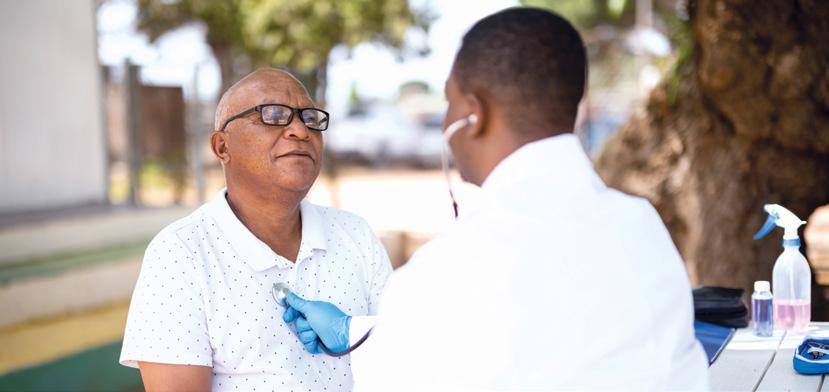
The Ramsay Hospital Research Foundation aims to align with the Paul Ramsay Foundation’s goal of breaking the cycle of disadvantage by addressing key social determinants of health.
“The social determinants of health (SDH) are the non-medical factors that influence health outcomes. They are the conditions in which people are born, grow, work, live, and age, and the wider set of forces and systems shaping the conditions of daily life.”
(World Health Organisation)
RHRF’s most prominent grant scheme, the ‘Translational Challenge Grant’ specifically seeks to fund translational research projects that will break the cycle of disadvantage and improve patient outcomes by addressing specific social determinants of health.
The scheme’s criteria, requires funded projects to demonstrate a commitment to improving social disadvantage by including one key determinant of health. The project must also be undertaken at both a Ramsay site and a non-Ramsay site, include a diverse patient population and benefit patients in both private and public healthcare settings.
The Social Determinants of Health (SDH) Innovation Grant is the outcome of extensive collaboration with the community and key stakeholders, including directors, and is designed to challenge conventional approaches to projects, encouraging researchers to address and focus on the social determinants of health. This new funding initiative is set to launch in Q3 2024.
To ensure that the SDH Innovation Grant aligns with the broader mission of RHRF and is positioned to enhance the care patients receive through Ramsay Health Care Facilities, the 2024 grant round focused on health issues that affect the following population cohorts; Women, Regional & Rural Populations, and People aged over 60 years.
This alignment between the Paul Ramsay Foundation’s mission and the RHRF’s new grant scheme underscores a shared commitment to addressing the root causes of health disparities and fostering environments where all individuals can achieve their full health potential.
SDH Innovation Grant
• Is a new initiative for RHRF.
• Seeks to develop a sustainable approach to addressing SDH in partnership with other healthcare and community organisations.
• Focuses on innovative projects and co-design with consumers involvement to develop solutions to the identified issues.
Priority populations
Women
People aged over 60
Regional & Rural Population
Key Criteria
• Addresses the non-health care factors that affect health outcomes of the identified population when they are diagnosed with cancer, mental health, cardiovascular disease (CVD) or musculoskeletal disease.
• Involves patients treated in the public sector as well as within Ramsay Health Care facilities.
• Accesses a diverse population and deliver benefits for all Australians.
• Includes individuals with lived experience or community representative as co-leads in the project.
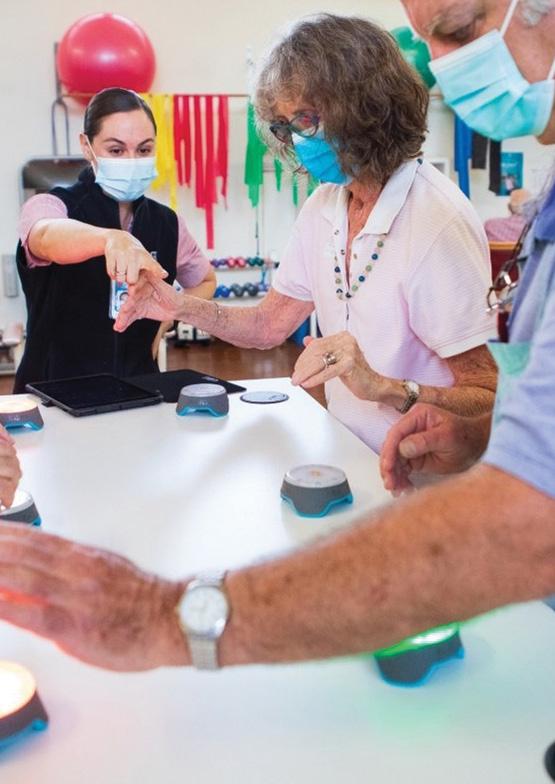
With initial funding from RHRF and the dedicated support of the Clinical Trials Network— developed specifically to facilitate and advance RHRF-funded research—the project team has effectively leveraged these resources to secure additional funding and investment from collaborative groups and pharmaceutical companies. This strategic infrastructure and support from RHRF have been pivotal in driving the research forward, enabling the development and testing of innovative treatments with the potential to deliver significant clinical impact.
Awarded $400,000 in funding from RHRF in 2023, the study intends to screen patients across 15 sites identifying men with a certain lipid profile, indicative of a poor prostate cancer prognosis and randomising them to either standard treatment or to receive a novel lipid metabolic therapy.
10 years ago, working with a cardiovascular researcher at the Baker Institute, the team looked at profiling the lipids in the blood and identified there are certain lipids (called Sphingolipids) that when elevated, result in poorer outcomes for patients with prostate cancer, primarily through treatment resistance to standard care drugs. The survival rate for these patients is half that of those without this lipid profile.
The team developed a blood test, called PCPro, that can be performed in a normal hospital biochemistry lab, identifying a biomarker signature indicative of a poor prognosis for those with metastatic prostate cancer, prior to patients beginning their treatment. This early identification of those at risk of poorer treatment outcomes, allows for the RHRF funded Clinical Trial to take place, providing capacity to test a new treatment for these patients.
PCPro is a simple, cost-effective test and the novel treatment (opaganib) is an oral medication. Together, this treatment can be delivered across diverse geographic and socioeconomic areas of the Australian population, enhancing health outcomes.
The team collaborated with the Australian and New Zealand Urogenital and Prostate Cancer Trials Group (ANZUP) to make this possible and have leveraged the RHRF funds to form a partnership with Bayer Pharmaceuticals as well as RedHill BioPharma who have provided the lipid drug ‘Opaganib’. These collaborations enable the study to progress to the next stages, with intention to roll the trial out at 15 sites across Australia and New Zealand, with the intention for clinical implementation if successful.
“It’s really groundbreaking… This has been a very exciting time for us that Australia is going to lead the way in this. There are other lipid studies going on, but none of them are biomarker and precision medicine driven … and we could not have done it without the Ramsay Hospital Research Foundation Grant … this has been the catalyst to allow us to develop the trial and leverage into pharma to make the whole thing happen”
– Professor Lisa Horvath – co-investigator on the DARO-Lipid Study.


The Biostatistics Consultation Pilot Service launched in June 2024, significantly enhancing research capabilities by providing comprehensive support and guidance across all stages of a research project.
This service aids researchers in evaluating project feasibility, refining research questions, identifying outcomes, and managing confounding variables. Additionally, it offers practical guidance on data collection methods, database management, including data collection on REDCap. By assisting with analyses and interpreting results, this new service ensures researchers are better equipped to conduct robust and impactful studies.
Designed for all stages of the research journey, this consultation provides tailored advice to:
• Address ethical considerations in project planning.
• Understand governance requirements.
• Resolve challenges in ethics applications or compliance.
• Guide protocol and Patient Information and Consent Form design
In addition, our team offers online training for each one of our grant recipients to REGGS, our online Ethics & Governance portal. This enables recipients to seamlessly submit their Site Applications and post approval, use this interface to maintain their reporting obligations for the duration of the study via Amendments and Milestones.
RHRF provides grant writing support to enhance researchers ability to secure funding for impactful projects.
The support offers researchers guidance at every stage of the grant application process, including refining research aims, developing a clear and concise narrative, designing a strong methodology, and articulating the potential impact of the proposed research.
With a focus on clarity, impact, and alignment with funder expectations, the goal is to increase the competitiveness and quality of research grant submissions, ultimately supporting the growth and success of groundbreaking research initiatives.
RHRF provides support for researchers in developing robust protocols and applications for external grants, (including MRFF or NHMRC grants). Our expert team collaborates closely with researchers to ensure their proposals are well prepared, for the best chance at securing funding.
As RHRF’s most prominent Grant Scheme, the Translational Challenge Grant (TCG) is designed to fund research projects that address social determinants of health—such as education, socioeconomic status, lifestyle risk factors, and environment—to break the cycle of disadvantage and improve patient outcomes.
Projects must be undertaken at both a Ramsay site and a non-Ramsay site, include a diverse patient population and benefit patients in both private and public healthcare settings.
All RHRF research grant applications are assessed by a Scientific Review Panel which then put forward recommended projects to the RHRF Board.
The Scientific Review Panel assist and advises the Board of Directors of the Ramsay Hospital Research Foundation (RHRF) on matters relating to assessment of research funding applications to the Foundation and with allocation of Foundation’s funds to clinical research.
The panel primarily makes recommendations regarding the review and evaluation of grant proposals and other research submissions, determining the assessment criteria for RHRF grant applications, and recommending the allocation of RHRF funds to scientific research.
The panel consists of:
• Professor Helen Christensen, Director
• Dr Robert Herkes, Director
• Professor Sally Redman, Director
• Ms Nicola Ware, CEO & Company Secretary
Involvement of external reviewers and consumers in the scientific review panel in the future grant rounds is underway.
RHRF would like to extend a big thank you to all panel members for their ongoing contribution and investment in the RHRF grant process.
The funding matrix is used to evaluate and allocate research grants, ensuring that funding supports projects with the highest potential for scientific advancement and societal impact. It prioritises research that addresses health inequalities, improves patient outcomes, and bridges gaps in healthcare, particularly in underserved communities.
The funding matrix was developed collaboratively with input from the Scientific Review Panel to ensure alignment with our strategic priorities.
Following criteria rated on a scale from 1 to 5 are used for scoring of the grant applications:
• Research Quality (addressing innovative and creative research topic)
• Research Significance and Innovation (positive impact on patient outcomes and patient comfort)
• Research Capability (experience and track record of the research team)
• Social Determinants of Health (to bridge of the gap in health inequality)
RHRF is governed by a Board of Directors who guide the direction of the research we fund. The Board is also responsible for monitoring compliance with legal and regulatory obligations and operational and financial performance.









The role of the RHRF Audit and Risk Committee is to assist the Board to discharge its responsibilities by reviewing and then making recommendations in relation to financial oversight & management of risk within RHRF. The committee does not replace or replicate established management responsibilities and delegations within the Foundation, or the reporting lines and responsibilities of audit functions. Unless expressly delegated by the Board, the committee does not have decision-making powers but acts on the direction of, and makes recommendations to, the Board. The responsibilities, authority, membership, meetin in the Committee Charter.
The Audit and Risk Committee consist of at least three members and a maximum of five. All members of the Board, not formally appointed to the committee, have a standing invitation to attend meetings of the committee. Members:
• Ms Jennifer Samson (Chair)
• Dr Robert Herkes, Director
• Ms Nicola Ware, CEO & Company Secretary
Revenue
Total revenue: $6,077,916.00
Key
• Revenue from government: $0.00 (0.00%)
• Revenue from Donations and Bequests: $5,000,000.00 (82.27%)
• Revenue from Goods or Services: $480,758.00 (7.91%)
• Revenue from Investments: $597,158.00 (9.83%)
• Other Revenue: $0.00 (0.00%)
Expenses
Total expenses: $3,955,128.00
Key
• Grants and donations made for use in Australia: $2,842,554.00 (71.87%)
• Grants and donations made for use outside Australia: $0.00 (0.00%)
• Interest expenses:$916.00 (0.02%)
• All other expenses: $149,001.00 (3.77%)
• Employee expenses: $962,657.00 (24.34%)
In 2017 RHRF invested $3 million to establish a National Clinical Trials Network, facilitating cutting edge clinical trials and other research that explore innovative treatments and therapies within Ramsay Health Care.
The Network equips RHRF with the essential capability to conduct the research that we fund. With this infrastructure in place, RHRF is better positioned to support innovative research and enhance the quality of care provided to patients.
National Clinical Trials Network is made up of...
$3M 66 120+ 400+ 70+ 20 50% 91
$3 million in seed funding from Ramsay Hospital Research Foundation
Clinical Trials Sites
Active Clinical Trials
Active Clinical Trials Staff
Principal Investigators
Active participants treated weekly within the Network in 2024 of our recruited participants are first patient, first in human phase 1 trials
Patient Experience Score (NPS) Site Average for 2024
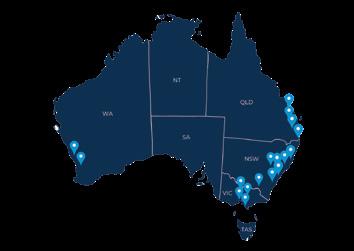



There is a strong national policy and funding focus on early and ongoing involvement of health consumers and the community in the design, conduct and reporting of clinical research.
RHRF is committed to integrating consumer involvement and input into all research activities, through:
• Involving consumers in the design of a Research Consumer Engagement Framework.
• Embedding research consumers into the RHRF Scientific Review Panel to assist in reviewing grant applications.
• Ensuring there is involvement from research consumers into RHRF grant applications.
• Collaborating with Ramsay Health Care Consumer Engagement structures to streamline the process of embedding research consumers into hospital research activities.
Research Consumer Representative on the RHRF funded study “Optimising outcomes for frail hospitalised older adults - volunteer support and pain assessment interventions: A cluster randomised control trial”, led by Professor Rosemary Saunders.
Sue’s perspective, along with all consumers, is invaluable in shaping research design and execution as it allows for more patient-centered and impactful results.
Sue’s role has been particularly impactful in frailty research, where she collaborated closely with researchers and nurses on the RHRF funded project “Optimising outcomes for frail hospitalised older adults - volunteer support and pain assessment interventions: A cluster randomised control trial”, led by Professor Rosemary Saunders.
Her contributions have focused on ensuring patients receive the necessary and appropriate support post-hospitalisation. By sharing her perspective and knowledge, Sue has been invaluable in shaping not only how some of the research questions are framed but also in how patient interactions are handled, to ensure patients receive the most beneficial types and methods of support.
Reflecting on her experience, Sue shares,
“It’s good, not only for me personally, but I know that what I’m looking after is actually going to help patients down the track.”
Sue’s journey highlights the importance of consumer involvement in research. She advises others considering similar roles:
“There’s an understanding that you don’t have to know everything, and you’re only putting information forward as to how you feel, as a consumer”.
Her story is a testament to the value of consumer perspectives in enhancing research outcomes and ultimately improving patient care.
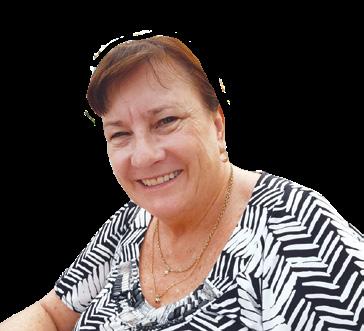
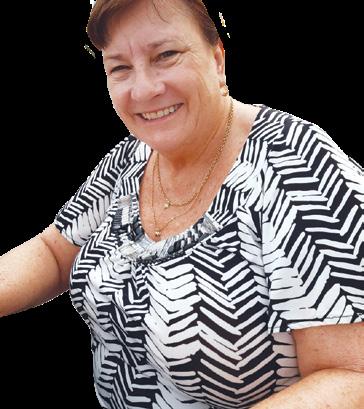
RHRF values cross-system collaboration and aims to foster a culture of research that prioritises partnerships with different organisations
We will continue building strong connections and relationships to increase capacity and capabilities to achieve our mission of improving patient outcomes in Australia. RHRF have provided 10 letters of support for NHMRC and MRFF Grants from April to September 2024 and funded 4 partnership projects to date.
To promote cross-system collaboration, RHRF funds and supports collaborative research projects aimed at improving patient outcomes, enhancing models of care and breaking the cycle of disadvantage. RHRF provides up to $400,000 in cash contributions per project for a duration of up to five years. RHRF partners in the approved project and commits funding contingent upon the success of a partnership grant (such as NHMRC, MRFF, ARC or similar Australian grant schemes).
RHRF Funded Partnership Projects with MRFF and NHMRC Grants.
The Australian Brain Cancer Registry Project
Led by Associate Professor Rosalind Jeffree and awarded $400,000 by RHRF in conjunction with a successful MRFF Grant.
CARE Network: Australasian Partnership for Improving Outcomes in Severe Depression
Led by Professor Colleen Loo and awarded $750,000 by RHRF in conjunction with a successful NHMRC Grant.
Pasteurised donor human milk supplementation for term babies
Led by Associate Professor Jennifer Koplin and awarded $722,852 by RHRF in conjunction with a successful NHMRC Grant. Contract is awaiting finalisation.
Osteoarthritis management: Face to face versus remote care
Led by Professor David Hunter and awarded $202,540 by RHRF in conjunction with a successful NHMRC Grant. Contract is awaiting finalisation.
The Collaborative Research Request Grant round previously operated as a rolling process where applications were triaged as they were received. Moving forward, we plan to hold two competitive grant rounds annually for the collaborative research request grant scheme.
$784,731
Total amount awarded in the 2024 CRR grant round
A total of four applications were recieved in this grant round and two were successful
• One project focusing on Mental Health has been allocated $389,687
• Another project focusing on Orthopaedic Surgery and Musculoskeletal Injury has been allocated $395,044
Attendance at conferences provides invaluable opportunities for networking, knowledge exchange and collaboration with leading experts and institutions. RHRF’s active engagement allows us to strengthen our research capabilities, foster new partnerships, stay at the forefront of medical research, and ultimately enhance the impact of our research within the healthcare community.
This year, RHRF exhibited at both ARCS Australia Annual Conference – ICC, Sydney, 12-14 June, and SCRS Australia & New Zealand Site Solutions Summit –Grand Hyatt, Melbourne, 15-17 July
Ramsay Hospital Research Foundation held the 4th annual Research Month in September to celebrate all the research happening right across Ramsay Health Care’s network.
Researchers and research groups submitted creative entries to the 3-Minute Video competition, outlining their amazing work.

View all the videos here
Ramsay Research Month: 3-Minute Video Competition 2024 - YouTube
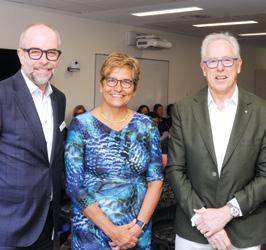
First Place for both the Internal Judging category and the ‘People’s Choice’ category was awarded to Clara Massaneda Teneu and her team who presented their work on The Randomised Controlled Trial of Frontoparietal and Temporoparietal Electroconvulsive Therapy (ECT) for Severe Depression: The RAFT ECT Study.
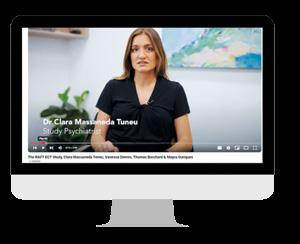
Our 20 national Clinical Trials Sites celebrated the research undertaken at their site through a variety of morning teas, presentations, and networking events. These events provided an opportunity for researchers, doctors, patients, staff and the public to better understand how research at Ramsay is conducted.

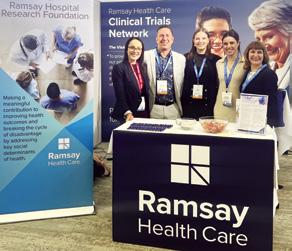
RHRF aims to extend our impact beyond funding of clinical research projects. We strive to conduct research that significantly contributes to the economy and society by addressing pressing health issues across diverse communities, ensuring real world impact.
As we look ahead, RHRF plans to focus on the following areas:
A key focus for us is to address the social determinants of health more effectively and meaningfully. By establishing collaborations with targeted communities and understanding and tackling their social and health issues, we aim to reduce health inequalities and improve outcomes for all communities.
We are committed to building strong partnerships with universities, public healthcare institutions, not for profit, community, industry and other organisations. These collaborations will enable us to conduct high-quality research that can be translated into practice and to profile the research activities conducted at Ramsay.
We are dedicated to continuously developing our capabilities and increasing the research capacity across both RHRF and the Ramsay National Clinical Trials Network. This commitment ensures we can better facilitate research, support and educate the research teams and expand our therapeutic areas.
FUND AND SUPPORT high quality research
ENHANCE research enablers to facilitate high quality research
DEVELOP patient and key stakeholder relationships
OPTIMISE governance and funding processes
CULTIVATE a high quality national Clinical Trials & Research Network
ADDRESS systems change that aim to improve social determinants of health
Thank you to the Paul Ramsay Foundation
Ramsay Hospital Research Foundation would like to thank the Paul Ramsay Foundation, for its’ generous sponsorship and ongoing commitment to the advancement of health and medical research.
We wish to acknowledge and thank all the organisations and individuals that we work with to deliver our research program. The pursuit of high-quality research and its translation into meaningful real-world impact is a collaborative effort. We are deeply appreciative of the support, expertise, and resources provided by our partners, which have been instrumental in achieving our goals










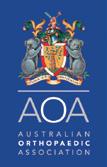

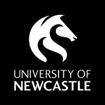
www.ramsayhealth.com.au/Ramsay-Research/